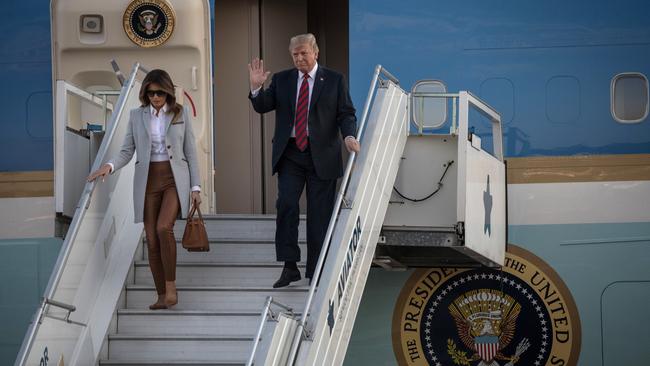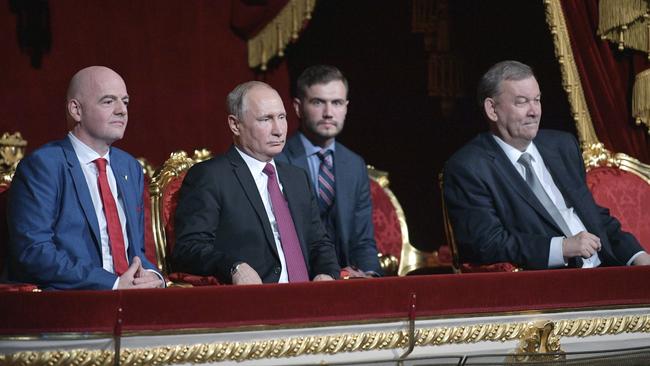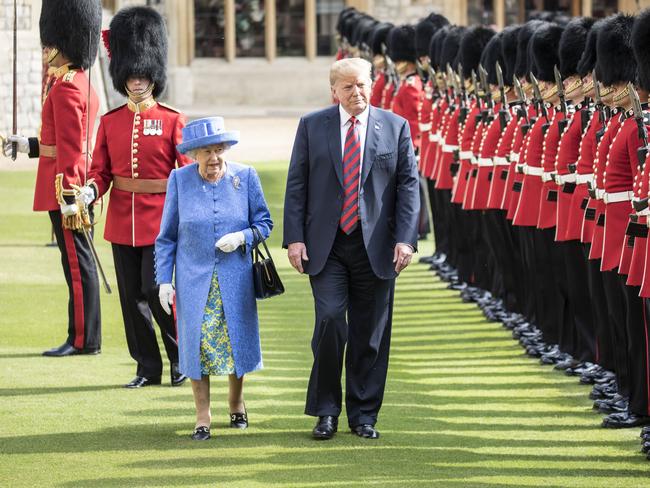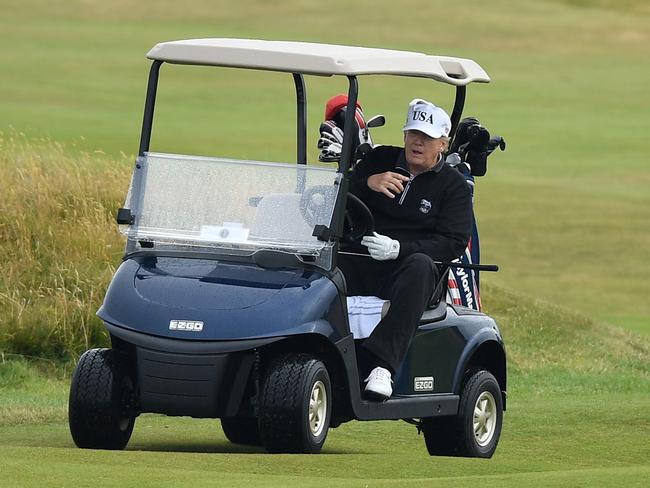Charging of Russian agents casts long shadow over Trump, Putin meeting
The twist in Donald Trump’s meeting today in Helsinki with Vladimir Putin came just as he arrived at Windsor Castle to meet the Queen.

The twist in Donald Trump’s meeting today in Helsinki with Vladimir Putin came just as the US President arrived at Windsor Castle to meet the Queen.
At that very moment across the Atlantic in Washington a nervous-looking Deputy Attorney-General Rod Rosenstein announced that 12 Russians were being indicted for hacking Democrat emails to tilt the 2016 US election in favour of Mr Trump. These were not ordinary Russians — they were spies from the GRU, Moscow’s military intelligence service that would never have conducted such an operation without the go-ahead from Mr Putin.
The timing of Mr Rosenstein’s announcement early on Saturday (AEST) could not have been worse. Today Mr Putin, who has always denied Russian involvement in the hacking, and Mr Trump, who has always been sceptical about Moscow’s involvement, will meet face-to-face.
It is a summit that Mr Trump has wanted ever since becoming President and which he proposed to Mr Putin in March against the wishes of his advisers.
Now, at last, two of the most forceful and controversial leaders of the world’s two largest nuclear powers will have their first official and extended summit together.
“I think I’d have a very good relationship with President Putin if we spend time together,” Mr Trump said at the weekend.
“And I may be wrong. You know other people have said, ‘it doesn’t work out’. But I’m different than other people.”
That’s an understatement. Mr Trump arrives at today’s summit in Helsinki amid the most chaotic and controversial European tour by a US president in memory.

Mr Trump has been at his disruptive best — or worst depending on your perspective — during the past week. He up-ended the NATO summit with a brawling mixture of threats, abuse and ultimately false claims of significant achievements in his push to convince America’s allies to spend more on their defence.
Then he almost up-ended his meeting with British Prime Minister Theresa May with an interview with the The Sun in which he launched an extraordinary attack on her Brexit strategy — which he later retreated from.
So Mr Putin, whose KGB training taught him to study the minds of his targets, must be wondering exactly what he will be up against in Helsinki today.
Both men blame outside forces for so far getting in the way of what they have openly hoped will become a close relationship. Mr Trump likes strong leaders and sees himself in that mould. He is close to China’s President Xi Jinping and has praised strongmen from Turkey’s Recep Tayyip Erdogan to The Philippines’ Rodrigo Duterte and more recently North Korea’s Kim Jong-un.
Mr Putin rides topless on horseback across the plains, has unquestioned authority over his country and — like Mr Trump — thumbs his nose at political convention. He in 2015 described Mr Trump as “a really brilliant and talented person” and has welcomed his desire for a closer relationship with himself and Russia. The fact Moscow used its military spies to advance Mr Trump’s chances against Hillary Clinton illustrates just how much Mr Putin preferred him to Mr Clinton.
Whether these two leaders continue to be well disposed to each other in Helsinki today is another question. Mr Trump clearly wants to make this summit work but says he is not going into it with “high expectations”. From Mr Trump’s perspective, his hopes of forging a close bond with Mr Putin have been undercut by the timing of the indictments of the Russians.
The indictments contain difficult-to-refute evidence of direct and high level involvement by the GRU in the US election. Even so, Mr Putin will today repeat his denials of Russian involvement.
The indictments have placed Mr Trump in a difficult position.

If he vigorously challenges Mr Putin on this issue — as senior Republicans like John McCain have urged — then Mr Trump is unlikely to foster any personal rapport with the Russian leader. But if Mr Trump skates lightly over the issue, he faces a storm of criticism from within his own party and more broadly back in the US.
Mr Trump has always been loath to admit Russian involvement in the US election. This was initially because he saw it as undermining his legitimate victory over Clinton and as a crutch which was being used by some Democrats to blame for their defeat.
He at first denied outright any Russian inference in the election but over the past year has been equivocal about the possibility without ever confirming that he believed it was true.
But if Mr Trump confronts Mr Putin vigorously over the issue now, he lends legitimacy to Mr Mueller’s Russia investigation at a time when he is stepping up his attacks on it. “I think we are getting hurt very badly by the witch-hunt,” he said at the weekend.
“It makes it very hard to do something with Russia. Anything you do, it’s always going to be, ‘Oh, Russia, he loves Russia’. I love the United States. But I love getting along with Russia and China and other countries.”
Mr Rosenstein — who Mr Trump has considered sacking — said the timing of the indictments was related to evidence and not politics. He said Mr Trump was briefed before he left Washington, meaning they would not have come as a surprise to the President.
Speaking before Mr Rosenstein’s announcement, Mr Trump insisted he would raise the issue of election interference directly and “firmly” with Putin. “I don’t think you’ll have a ‘Gee, I did it. I did it. You got me.’ There won’t be a Perry Mason here, I don’t think. But you never know what happens right? But I will absolutely firmly ask the question.’
Mr Trump and the White House have so far been careful not to criticise Russia or Mr Putin about the evidence of interference contained in the new indictments.
In his first reaction to the news, Mr Trump yesterday chose to criticise his predecessor Barack Obama for failing to do anything to stop the hacking prior to the November 2016 election. In a statement the White House also avoided any criticism of Russia or Mr Putin, focusing instead on the absence of any evidence of collusion between Russia and Trump associates.
The outcome of today’s summit is harder to predict than most because it was driven by Mr Trump without a clear agenda and with relatively little preparation.
The two leaders have met only briefly twice before — on the sidelines of the APEC summit in Vietnam last November and last July at the G20 meeting in Hamburg. But this time their meeting will span at least four hours, including an extended time when Mr Trump and Mr Putin will be alone in a room together. If they are going to ever develop a rapport, or even a friendship, it will begin today in a room in Helsinki.

Mr Trump says he will discuss Syria, the Middle East, Ukraine and nuclear proliferation. The White House wants Russia to provide less support to dictator Bashar al-Assad and to counter Iran’s growing influence in Syria.
There is concern on Capitol Hill that Mr Trump’s enthusiasm for developing a connection with Mr Putin will cause him to so soft on these key issues including Russia’s 2014 annexation of Crimea and US sanctions. Since Mr Trump’s election, US policy on Russia has appeared disconnected at times: congress has pursued tougher sanctions against Moscow in contrast to Mr Trump’s conciliatory rhetoric.
However Mr Trump argues he has pursued a tougher policy towards Moscow than previous presidents. As an example he cites his decision in March to expel 60 Russian officials in response to the poisoning of former spy Sergei Skripal and his daughter, Yulia, in the English city of Salisbury on March 4.
Some have speculated the more experienced and calculating Mr Putin has an advantage over the unscripted and unpredictable Mr Trump. “An Amateur Boxer Up Against Muhammad Ali,” says a headline in The New Yorker.
Mr Putin in 2007 brought his black Labrador Konni into a one-on-one meeting with German Chancellor Angela Merkel who is known to be afraid of dogs.
Former US ambassador to Moscow, John Beyrle told The New Yorker: “I’ve been involved with most US-Russian high-level encounters since then Vice-President George H. W. Bush’s first meeting with Soviet leader Mikhail Gorbachev, in 1985. There is no historical precedent that I know of for such a potentially high-stakes US-Russia meeting to take place with so little advance preparation, and with such a dark cloud of suspicion and uncertainty hanging over it. We really are in uncharted waters here.”
Mr Trump dismisses any fears that Putin will play him like a violin. Like in his Singapore summit with Kim, Mr Trump will back his self-proclaimed ability to read someone quickly and judge whether he can do business with them. He even suggested he might somehow persuade Mr Putin to withdraw his troops from Crimea.







